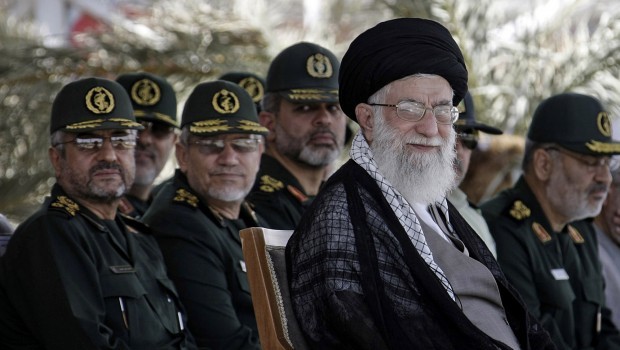
In this photo released by the official website of the Iranian supreme leader’s office, supreme leader Ayatollah Ali Khamenei, foreground right, attends a graduation ceremony of a group of Revolutionary Guard members, in Tehran, Iran, Monday, May 27, 2013. (AP Photo/Office of the Supreme Leader)
“Based on the costly experience learned from 2009 unrest, all preventive security measures have been put in place well before this upcoming election,” said Abdollahi.
A broad array of security measures have been put in place by Iranian authorities over the last three month, including the arrest of dozens of journalists and summoning of political activists for questioning. The Supreme Council for National Security has also been issuing guidelines to Iran’s press barring them from covering specific topics and even individuals.
Publishing photos and comments made by opposition leaders Mir Houssein Mousavi and Mehdi Karrubi have been banned for more than 2 years. Many journalists who have been detained and threatened are understood to have fled the country.
Mohammad Reza Naghdi, the commander of the Basij Force, has acknowledged that the supreme leader has advised the armed forces not to interfere in the election, according to comments reported on the Fara-Ru news website.
The Basij is a sub-branch of Revolutionary Guards with paramilitary personnel stationed in every neighborhood across Iran’s cities.
Naghdi denied that a direct order has been issued on the matter, but reiterated that all personal are free to attend political meetings, according to Fara-Ru.
At the same time, Mohammad Reza Tooserkani, the supreme leader’s representative to the Basij, has protested against calls for the Basij to be neutral in the election, and said its role was to provide reassurance that the elections would proceed properly, according to FARS news agency.
Many Basij personnel are members of polling station staff, and it has been alleged that they can exert influence on voters during polling day and throughout the counting procedure.
From 2012 onwards, the Basij has established local brigades with capability for rapid deployment and response to trouble spots. They are authorized to set up check points and arrest “suspicious” individuals, and are also armed.
In an address to military personnel at Imam Hussein Military University on Monday, Iran’s supreme leader Ayatollah Khamenei described his preferred criteria for the next president: “The elected president should be a true opponent of [Iran’s] enemies and a believer who improves the image of the Islamic Republic in front of the oppressed of the world,” he said.
“We do not know who will be the next president,” he added.
As things currently stand, Ayatollah Khamenei’s remarks are likely accurate. Despite the fact that 5 out of the 8 approved candidates are members of the “principalist” faction of Iran’s conservatives, they have vowed not to withdraw in favor of each other, making the chances for an outright win on June 14 very unlikely, and leaving the outcome uncertain in the absence of a frontrunner.
